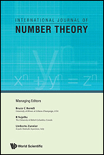
International Journal of Number Theory
Scope & Guideline
Unveiling the Mysteries of Algebra and Beyond
Introduction
Aims and Scopes
- Modular Forms and Their Applications:
Research on modular forms, including their properties, applications in number theory, and connections to elliptic curves and L-functions. - Diophantine Equations and Number Theory:
Exploration of solutions to various types of Diophantine equations, including classical problems and new conjectures. - Algebraic Geometry and Arithmetic Geometry:
Studies that focus on the interplay between algebraic geometry and number theory, particularly in relation to rational points on varieties. - p-adic Analysis:
Investigation into p-adic numbers and their applications in number theory, including the study of p-adic L-functions and hypergeometric functions. - Arithmetic Geometry and Galois Theory:
Research on Galois groups and their actions on various mathematical structures, as well as applications to arithmetic geometry. - Combinatorial Number Theory:
Investigations into partition functions, congruences, and combinatorial aspects of number theory. - Modular Forms and L-functions:
Studies on the properties and applications of modular forms and their associated L-functions, including explicit calculations and conjectures.
Trending and Emerging
- Elliptic Curves and Their Applications:
Research on elliptic curves has gained significant traction, particularly in their applications to cryptography and number theory, indicating a growing interest in their properties and implications. - Advanced Modular Forms and Their Generalizations:
There is an increasing focus on generalized modular forms, particularly in relation to their applications in various fields of mathematics. - Zeta Functions and Their Generalizations:
Research on zeta functions, including both classical and p-adic zeta functions, is on the rise, reflecting a deeper investigation into their properties and implications. - Computational Number Theory:
The rise of computational methods in number theory is evident, with more articles focusing on algorithmic approaches to solving number-theoretic problems. - Connections Between Number Theory and Other Fields:
Emerging themes include the interdisciplinary connections between number theory and other areas such as algebraic geometry, topology, and mathematical physics. - Geometric Aspects of Number Theory:
Research exploring the geometric interpretations of number-theoretic concepts is gaining popularity, indicating a trend towards visual and spatial understanding of numbers.
Declining or Waning
- Classical Number Theory:
While still an important area, classical number theory topics such as elementary number theory and basic congruences have seen a decline in favor of more advanced and specialized topics. - Historical Studies in Number Theory:
Research that focuses on the historical development of number theory concepts has decreased, as the journal increasingly emphasizes contemporary and applied mathematics. - Basic Algebraic Structures:
Investigations into elementary algebraic structures, such as basic group theory or simple ring theory, have become less common compared to more complex interactions with number theory.
Similar Journals

Journal de Theorie des Nombres de Bordeaux
Connecting Scholars Through Rigorous ResearchJournal de Theorie des Nombres de Bordeaux is a distinguished publication dedicated to the realms of algebra and number theory, emerging from the esteemed University of Bordeaux and specifically the Institut Mathématiques Bordeaux. With its ISSN number 1246-7405 and E-ISSN 2118-8572, this journal has been a pivotal platform for researchers since its inception in 1996, and it continues to foster innovative mathematical scholarship through 2024. Notably, the journal is recognized in the Q2 category of 2023 in both Algebra and Number Theory, affirming its significance within the academic community where it ranks #99 out of 119 in its field according to Scopus metrics. Although it operates without open access, it provides valuable insights and peer-reviewed articles that contribute to the ongoing dialogue in mathematics. As the global interest in number theory intensifies, the Journal de Theorie des Nombres de Bordeaux remains an essential resource for mathematicians, researchers, and students alike, encouraging rigorous exploration and dissemination of knowledge in this vital area of study.
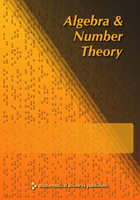
Algebra & Number Theory
Connecting Scholars Through Cutting-Edge Mathematical InsightsAlgebra & Number Theory, published by Mathematical Science Publications, stands at the forefront of mathematical research, particularly in the fields of algebra and number theory. With an ISSN of 1937-0652 and E-ISSN 1944-7833, this esteemed journal provides a dedicated platform for the dissemination of cutting-edge theoretical advances and practical applications. It has achieved a Q1 category ranking in both algebra and number theory according to the 2023 quartiles, reinforcing its critical role in shaping contemporary mathematical discourse. The journal serves as an essential resource for researchers, professionals, and students alike, offering insights into diverse mathematical methodologies and fostering open dialogue among scholars. Although it does not provide open access, its robust impact factor reflects the high quality and relevance of its published work. Based in the United States at the University of California, Berkeley, the journal's commitment to excellence continues to attract contributions that push the boundaries of mathematical understanding.

Research in Number Theory
Pioneering insights into the intricate realm of number theory.Research in Number Theory is a prestigious journal eagerly embraced by the mathematical community, focusing on the intricate and profound aspects of algebra and number theory. Published by Springer International Publishing AG, the journal showcases cutting-edge research from 2015 to 2024, making it a pivotal platform for advancing knowledge in its field. With its ISSN 2522-0160 and E-ISSN 2363-9555, this journal holds a commendable position in the academic ecosystem, as evidenced by its ranking in the Q2 quartile for the category of Algebra and Number Theory in 2023. Despite being positioned within a competitive percentile, this journal aims to foster innovation and discovery, providing researchers, professionals, and students with valuable insights into the ever-evolving landscape of number theory. While the journal currently operates under a traditional publishing model, it is committed to disseminating high-quality, impactful research that propels the discipline forward. Join the conversation and contribute your work to a publication that is at the forefront of mathematical discovery.
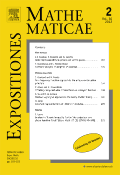
EXPOSITIONES MATHEMATICAE
Unveiling New Perspectives in MathematicsEXPOSITIONES MATHEMATICAE, published by Elsevier GmbH, stands as a significant journal in the realm of mathematics, catering primarily to researchers, professionals, and students. With an ISSN of 0723-0869 and an E-ISSN of 1878-0792, this journal has made its mark in the academic community, boasting a Q2 classification in the miscellaneous mathematics category for 2023, illustrating its prominence within its field. The journal addresses a diverse scope of mathematical topics, encouraging the publication of original research and innovative theories while maintaining rigorous academic standards. As it converges from 2004 to 2024, EXPOSITIONES MATHEMATICAE continues to be an essential resource for advancing mathematical knowledge and fostering scholarly communication, despite being a non-open-access publication. Its location in Munich, Germany further anchors it within a rich intellectual tradition, providing accessibility for the mathematical community worldwide.

CANADIAN JOURNAL OF MATHEMATICS-JOURNAL CANADIEN DE MATHEMATIQUES
Where rigorous research meets mathematical curiosity.Canadian Journal of Mathematics - Journal Canadien de Mathématiques is a prestigious peer-reviewed journal published by Cambridge University Press, which aims to advance the field of mathematics through the dissemination of high-quality research articles. With its ISSN 0008-414X and E-ISSN 1496-4279, the journal plays a pivotal role in fostering mathematical research and collaboration. It has been recognized for its impactful contributions, currently holding a category quartile ranking of Q2 in Mathematics (miscellaneous) for 2023 and sits in the 66th percentile among its peers according to Scopus rankings. As the journal continues its convergence from its inception in 1994 through to 2024, it remains a vital resource for researchers, professionals, and students seeking to stay at the forefront of mathematical developments. The journal does not operate under an open access model, allowing for a curated collection of articles that adhere to rigorous academic standards.
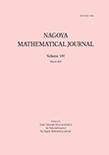
NAGOYA MATHEMATICAL JOURNAL
Advancing Mathematical Scholarship Since 1950NAGOA MATHEMATICAL JOURNAL, published by Cambridge University Press, is a prestigious journal that has been at the forefront of advancing mathematical scholarship since its inception in 1950. With an ISSN of 0027-7630 and an E-ISSN of 2152-6842, this journal has gained recognition for its high-quality research contributions in the field of mathematics, achieving a Q1 classification in Mathematics (miscellaneous) as of 2023. The journal’s impact is further reflected in its Scopus rank of #164 out of 399 in the General Mathematics category, positioning it within the 59th percentile of its peers. Scholars, researchers, and students can access a range of innovative mathematical studies that explore diverse topics, fostering a vibrant dialogue within the mathematical community. By catering to a global audience, the NAGOYA MATHEMATICAL JOURNAL continues to play a critical role in shaping contemporary mathematical discourse and research.
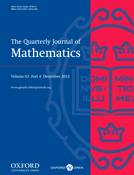
QUARTERLY JOURNAL OF MATHEMATICS
Exploring the Depths of Mathematical InnovationQuarterly Journal of Mathematics, published by Oxford University Press, stands as a pivotal resource for the mathematical community, focusing on a broad spectrum of topics in the field of mathematics. With its esteemed history dating back to 1930, this journal continues to foster innovative research and discussions, providing a platform for scholars to share their findings and insights. Although the journal currently holds a Q3 classification in mathematics (miscellaneous) and is ranked #207 among general mathematics publications in the Scopus database, its commitment to quality and rigorous peer review ensures that it remains relevant and insightful. Researchers, professionals, and students alike will find the Quarterly Journal of Mathematics an invaluable tool for advancing knowledge and understanding in various mathematical disciplines, making it an essential addition to any academic library.
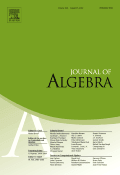
JOURNAL OF ALGEBRA
Fostering Excellence in Algebraic ResearchThe JOURNAL OF ALGEBRA, published by Academic Press Inc. Elsevier Science, is a premier scholarly outlet dedicated to the field of algebra and number theory. With its impressive Q1 ranking in the 2023 category of Algebra and Number Theory and a solid Scopus rank of #46 out of 119, it stands as a crucial resource for researchers and professionals seeking to deepen their understanding of advanced algebraic concepts. Operating since 1964 and continuing through 2025, the journal boasts a rich history of publishing influential research that drives the discipline forward. While the journal does not currently offer open access options, it remains committed to providing high-quality peer-reviewed content to the academic community. Its comprehensive archive and cutting-edge research articles serve as essential tools for students, researchers, and practitioners aiming to stay at the forefront of algebraic studies.
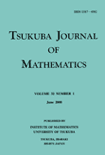
Tsukuba Journal of Mathematics
Advancing Mathematical Frontiers with Rigorous ResearchTsukuba Journal of Mathematics is a distinguished publication dedicated to advancing the field of mathematics through the dissemination of innovative research and comprehensive studies. Published by the University of Tsukuba, Department of Mathematics, this journal serves as a vital platform for mathematicians, researchers, and students to engage with cutting-edge mathematical theories and methodologies. Although currently not available as an open-access journal, it maintains a strong academic presence, contributing significantly to the global mathematical landscape. The journal invites submissions across various branches of mathematics, aiming to foster scholarly communication and collaboration. The ISSN 0387-4982 and the E-ISSN 2423-821X further establish its credibility and accessibility among the academic community, supporting its critical objective of facilitating high-quality research output. Situated in Tsukuba, Japan, a hub for scientific research and development, the Tsukuba Journal of Mathematics is committed to bridging gaps in mathematical knowledge and encouraging exploration of novel ideas.

RENDICONTI DEL SEMINARIO MATEMATICO DELLA UNIVERSITA DI PADOVA
Advancing mathematical knowledge for a global audience.RENDICONTI DEL SEMINARIO MATEMATICO DELLA UNIVERSITA DI PADOVA, published by the European Mathematical Society, stands as a notable open-access journal with a rich history in disseminating research across various domains of mathematics. With an ISSN of 0041-8994 and E-ISSN 2240-2926, this journal has embraced open access since 2023, significantly enhancing its visibility and accessibility to a global audience. Situated in Germany, its publishing house is based at Technical University Berlin, which emphasizes its academic roots and dedication to fostering mathematical research. The journal features a quartile ranking of Q3 across multiple categories including Algebra and Number Theory, Analysis, Geometry and Topology, and Mathematical Physics as of 2023, indicating a vibrant contribution to the field, despite its challenge in specific rankings. Researchers, professionals, and students alike will find in this journal a platform for innovative ideas and significant findings that are crucial to the evolution of modern mathematics.